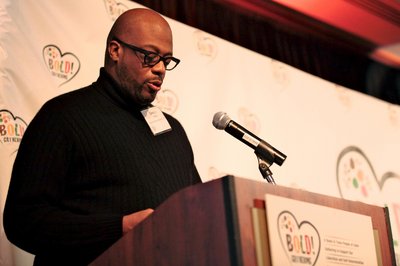Twenty Philadelphia LGBT leaders spent a weekend in Minneapolis earlier this month exploring the issues facing the people of color community, and headed back east with a wealth of ideas and information for the local community.
The first BOLD Gathering, Dec. 2-4, brought together about 180 LGBTs from all four corners of the nation and was hosted by PFund Foundation and Astraea Lesbian Foundation for Justice, on behalf of eight organizations that participate in the Racial Equity Initiative, including Philadelphia’s Delaware Valley Legacy Fund.
Representatives of 20 of the organizations funded through DVLF’s Racial Equity Initiative participated in the conference, making Philadelphia the most well-represented city at the event.
Gregory Walker, managing director of The Brothers’ Network, served on the planning committee for the event and was the representative of the Philadelphia cohort.
“We wanted queer and transgender people of color to develop support for our own liberation and self-determination,” Walker said. “We need to empower our community within a racial-equity lens to build a stronger, larger movement in the democratic process for our rights.”
Walker said the conference offered a rare opportunity for LGBT people of color organizations to share best practices, network and build community.
The attendees took part in a range of workshops, discussions and activities, and heard from 40 presenters, including a transgender African-American woman who participated in Stonewall.
Kevin Trimmel Jones, founder of the Black LGBT Archivists Society, said that listening to the longtime LGBT activists was an important moment for the younger generations represented.
“There were elders there who’ve been involved in the LGBT movement for a very long time and they shared a lot about their lives and the stories,” Trimmel Jones said. “It showed that storytelling is a very powerful tool in terms of motivating people to become involved in deeper forms of action.”
Trimmel Jones said that he was also impressed by the unity exhibited by LGBTs across a broad spectrum of racial and ethnic lines.
Having so many diverse people of color together to address the shared challenges they face was a valuable learning opportunity, said Elicia Gonzales, executive director of Gay and Lesbian Latino AIDS Education Initiative.
“It’s not very often that you have the opportunity to meet with other queer people of color organizations in such a structured way to network and share support for one another,” she said. “That was something I really appreciated, and I’m hoping to continue the conversation with the Philadelphia contingent to keep the momentum now that we’re back in Philly. There is a large number of people of color organizations in Philadelphia and we can be working to collaborate, pool resources and figure out our areas of common interest.”
The issue of resources was one that most of the groups had to contend with, Gonzales said.
One of the presenters took an informal poll during a session about the organizations’ budgets and staffing capacities, and most groups reported a budget of less than $50,000 and five or fewer employees or volunteers.
“It really struck me to be reminded of the amazing work that can be done with very little resources,” Gonzales said. “If people come together and see a need to fight for the rights of marginalized communities or against injustices, great things can happen. But it also saddened me that people are doing this great work and not being recognized and funded to the same degree as the larger, non-people of color organizations.”
Awareness-raising about the work that is being done, and the efforts that need more support, was among the conference’s aims, Walker said.
“Queer people of color are taking their ethnic and racial identities very seriously and we’re moving toward building a larger framework about how we advocate for ourselves,” he said. “The issues that are specifically affecting these communities need to be part of the larger LGBT movement, and the larger, mainstream LGBT organizations need to see that people of color are just as much a part of the community as others are.”
Walker said that conference organizers will examine opportunities to convene committees to keep the discussion moving forward throughout the year, and are hoping to make the BOLD gathering an annual event.
Jen Colletta can be reached at [email protected].
